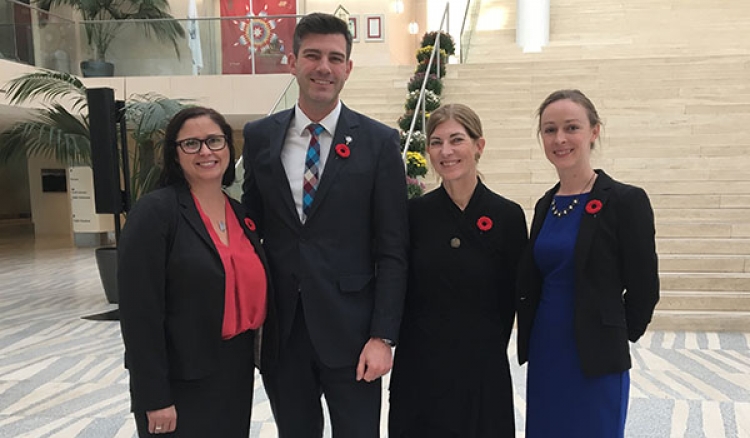 Officials in the city of Edmonton, Canada signed on as a vanguard city working with the Institute of Global Homelessness on its A Place to Call Home campaign. Susan McGee, CEO of Homeward Trust Edmonton; Edmonton Mayor Don Iveson; IGH Advisory Committee member Rosanne Haggerty; and IGH Director Kat Johnson gather in Edmonton. (Image courtesy of the Institute of Global Homelessness)
Officials in the city of Edmonton, Canada signed on as a vanguard city working with the Institute of Global Homelessness on its A Place to Call Home campaign. Susan McGee, CEO of Homeward Trust Edmonton; Edmonton Mayor Don Iveson; IGH Advisory Committee member Rosanne Haggerty; and IGH Director Kat Johnson gather in Edmonton. (Image courtesy of the Institute of Global Homelessness)
Last month in Edmonton, Canada, political leaders and advocates braved freezing temperatures to attend a forum on the city's newly updated plan to end homelessness. While homelessness has decreased in Edmonton by 43 percent since 2008, attendees identified several problems the city must solve to stay on track. For example, people who identify as Indigenous experience homelessness in Edmonton at a rate an alarming 10 times that of the general population.
Across the world in Adelaide, Australia, 125 people were sleeping outside during the most recent street count. While this level of street homelessness might appear manageable in the context of a larger city like Chicago, it is the highest level the city has seen since 2007. To reverse this trend, Adelaide has announced the Zero Project - an effort to bring street homelessness to zero and build on success to end homelessness across South Australia.
Street homelessness looks a little different in the two cities - and even more so in India, Brazil or the United Kingdom. Experts agree, however, that homelessness is a global challenge, with an estimated 100 million people worldwide living without shelter.
This year, the Institute of Global Homelessness has started initiatives that will help cities around the world work together to find solutions. A new campaign, "A Place to Call Home," aims to help 150 cities work toward ending street homelessness by 2030.
The cities of Adelaide and Edmonton signed on in November to be among the vanguard cities on the front line of this global movement.
"Adelaide and Edmonton are leading by example and will help other cities around the world set ambitious, achievable goals to end street homelessness," says Kat Johnson, director of the Institute of Global Homelessness.
The campaign will begin with a group of 10 to 15 vanguard cities across six continents. Each city will commit to achieving a goal by the end of 2020: either an end to street homelessness, a reduction in street homelessness, or a goal specific to a population of people living on the street.
More cities are expected to sign on in the coming months. In the summer of 2018, the institute will bring these cities together as they set goals, strengthen or develop their data collection systems and identify areas of improvement. The institute will share those findings with other cities, with the ultimate aim of reaching 150 cities who will end street homelessness by 2030.
"There is an emerging global movement to end homelessness, and A Place to Call Home gives us a focused way to share knowledge among leaders who might not otherwise learn about each other's work," Johnson says.
Homelessness looks different everywhere, and agreeing on definitions of homelessness had slowed down these types of collaborations in the past, explained Johnson. In 2015, the Institute of Global Homelessness released a framework that defines different types of homelessness so that international collaborators can work from the same definition.
The Institute of Global Homelessness is a collaboration led by DePaul University in Chicago and Depaul International, which is based in the United Kingdom. The institute serves as a central hub where practitioners, policymakers and researchers can find the tools they need to end homelessness on a global scale. Visit the
institute's website for more information.